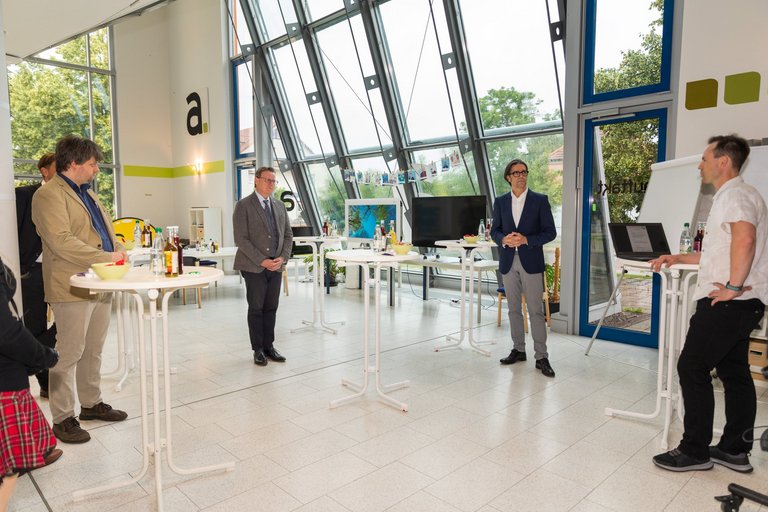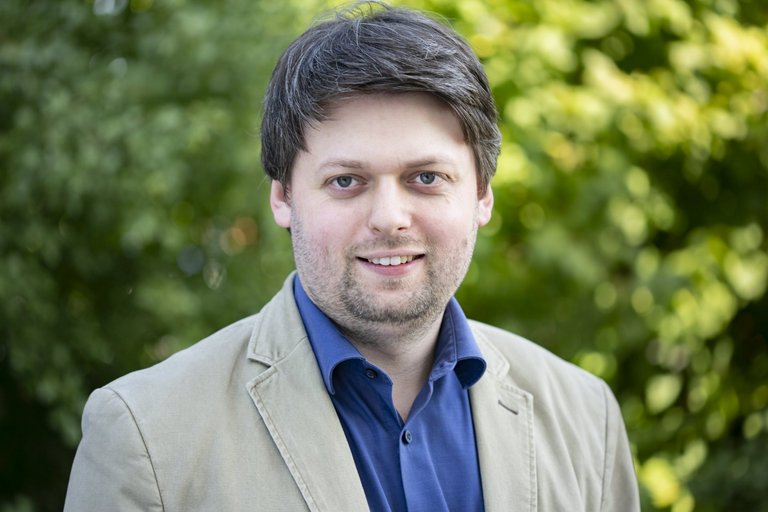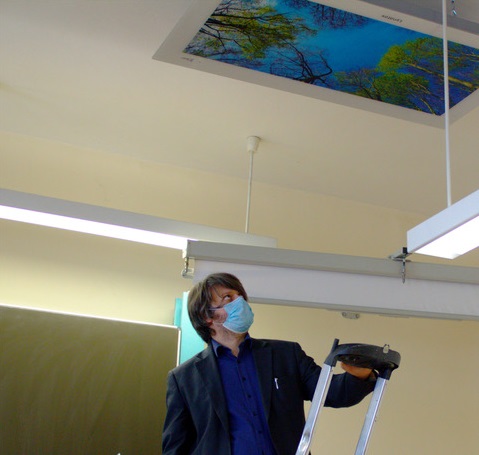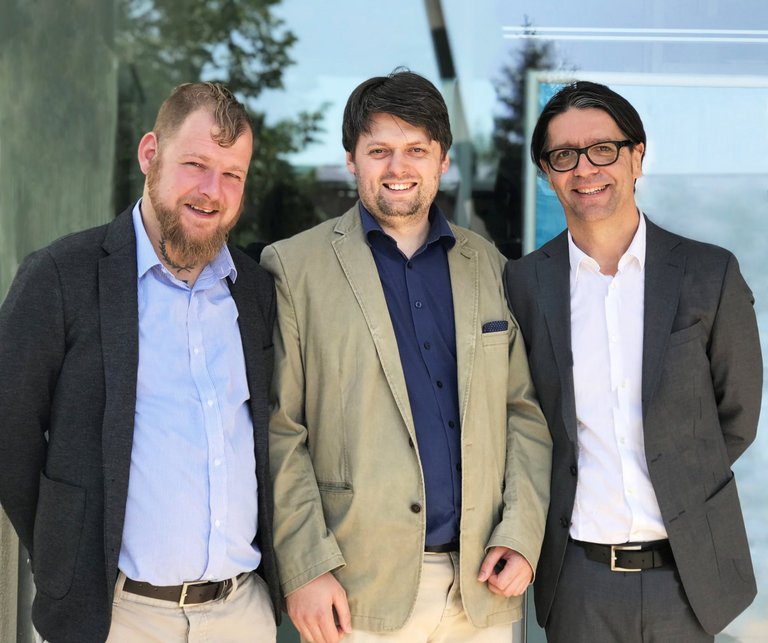As part of his "Social Cohesion" theme tour, Thuringia's Minister President Bodo Ramelow visited Lynatox GmbH in the Technology and Start-up Center on the campus of TU Ilmenau on Friday, July 9 - one of many companies, associations and individuals that have contributed to overcoming the crisis this year. It was founded in 2016 by TU graduate Daniel Martschoke and Tobias Schnabel and Lars Matting as a subsidiary of Synantik GmbH, a spin-off of TU Ilmenau. Their work focuses on the development and sale of products and systems that completely decompose organic pollutants in air and water through photocatalysis, i.e. the conversion of chemical substances under the influence of light. Barbara Aichroth spoke with CEO Daniel Martschoke about his work and the innovation location Ilmenau.

Mr. Martschoke, organic pollutants can be found in virtually every area of life and in the entire environment, and they can have a particularly negative impact on the quality of air and water and thus also on human health. So, conversely, the technologies you develop can be of great benefit to the environment and society?
Yes, in fact, many studies have been published recently showing a significant link between health damage and volatile organic compounds, or VOCs, for example brain damage caused by plasticizers, carcinogenic and hormonal effects of various VOCs, or sick building syndrome, which are non-specific illnesses and symptoms that occur after a long stay in a building. These substances are generally difficult to filter out or can only be degraded with high energy input, for example by thermal catalysis or UV burners. With our technology, we are able for the first time to permanently break down these substances with high efficiency.
At the heart of the technologies you develop is photocatalysis. Probably the best-known example of this is photosynthesis, in which plants use the energy of solar radiation to convert carbon dioxide and water into carbohydrates and oxygen. What exactly forms the basis of the technology you have developed?

Photocatalysis, discovered in the 1970s, is a light-induced reaction process on a semiconducting material. Similar to a solar cell, an electron-hole pair is formed. The only difference is that we do not gain electrical energy, but instead form highly reactive hydroxyl radicals from air and water. These react with any organic compound to form water vapor and some CO2 - in other words, a kind of "cold combustion". There is no danger to humans: the lifetime of the radicals is in the millisecond range and they do not leave our devices. Some people before us have already tried photocatalysis with moderate success. Together with the Materials Research and Testing Institute at the Bauhaus University in Weimar (MFPA), we succeeded in deciphering the reaction mechanism and subsequently developing our own highly efficient titanium oxide-based photocatalyst. Another point is that very efficient solid state UVA light sources have been available on the market for several years. Taken together, we have been able to increase efficiency by more than a factor of 100 compared to the state of the art five years ago, making us the first company economically capable of purifying air and water using photocatalysis.
What are typical application areas for these technologies?
The classic application for air purification is rooms contaminated with pollutants, for example PAHs, i.e. polycyclic aromatic hydrocarbons such as naphthalene, but also general odor problems and for hygiene purposes. In water applications, we are currently working on systems for groundwater remediation and the breakdown of oil films on water surfaces.
With the help of your catalyst technology, costly refurbishments can also be prevented if necessary?
In fact, we have already saved taxpayers many millions of euros in remediation costs. But even in properties where refurbishment is unavoidable, our air purifiers can be used as an interim solution to allow the facility to continue operating.
Your team is also currently working intensively with policymakers on integrating air purification devices into infection control concepts in connection with the Corona pandemic. What would be the benefit of these devices and what would be the advantage for public institutions such as schools and thus also for society?

In the summer of 2020, a laboratory was able to demonstrate for the first time that our photocatalysis not only kills viruses, but also completely degrades them down to the RNA level. As a result, no residual materials remain to be disposed of, such as used filter materials. If you mention schools, then one must also ask: What will happen to normal air purifiers, which are purchased now for a lot of money, after the Corona pandemic? Because of running costs and noise levels, they will hardly be operated beyond that time, and they will end up in storerooms and later on on electronic scrap.
We don't want that and focus on longevity, low running costs and wider benefits such as generally better indoor air quality and much lower exposure to VOCs and allergens. Daycare centers, doctors' offices, businesses, care facilities, and hospitality and lodging establishments can also benefit in the long term. If used on a large scale, some civilization diseases are likely to decrease noticeably.
How many years of research and development work preceded your company foundation in 2016?
Just one and a half years and another five years at MFPA. Since then, however, we have been working continuously and increasingly intensively on improving the technology and developing new products and further applications.
In your daily Lynatox mission, you identify with the human dream of living in a world that offers healthy living conditions for all people. Was that also the driving force for you personally to take the leap into self-employment?
To be honest, not primarily. My motivation was and still is to implement future technologies that I thought about during my school and university years in the form of free research and development. I quickly realized that I would need much more capital for this than I could earn as a normal person. So the idea was obvious to use the skills I had gained to develop and market products and use their proceeds to develop the next technologies...
As an interdisciplinary team of scientists, engineers, technicians and business people, you are active in research and product development as well as in production and sales. To what extent does networking play a role at the science and innovation location Ilmenau, in the Thuringia region and internationally?
Networking is not only important, but existential for young companies. Without networks, we would have no customers, suppliers, qualified employees or access to research projects. I originally come from the country and see how difficult it is there for a startup to gain an economic foothold. I can only recommend everyone to network intensively with Thuringia's innovation locations.
I find Thuringia itself to be an ideal environment for young companies due to the large number of small and medium-sized enterprises: We get almost all the necessary parts for our products from the region and there are many opportunities for novel services. The lack of large companies and their recruitment programs also makes finding suitable personnel much easier than in other locations. The central location in Germany and Europe is ideal for us. After a certain point, when customers are spread all over Germany, the exact location is no longer so important - the main thing is Thuringia!
In an international comparison, however, we still have a lot of catching up to do here, when I see the commitment shown to young companies in the USA or China... we can only dream of that here.
As a graduate of the TU Ilmenau, you bring with you extensive knowledge in power electronics and have also acquired extensive experience in the development of products and business models over the years, which you can now bring to your work as a company founder and CEO. What else should you bring to the table as a founder?
Perseverance, even if something doesn't work right away, but also the courage to radically change business models when opportunities arise. For all your love of technology, there's one thing you should never lose sight of: the company needs to be profitable as quickly as possible. Otherwise, you quickly run out of reserves to invest in new areas. This flexibility is often the only real advantage of small startups over large companies. Of course, it's also very important to have the right goals in life and a strong team to keep you motivated.
To what extent did your studies in Ilmenau, the support from the TU Ilmenau's startup service and the proximity to other young and dynamic companies at your company headquarters in the Technology and Startup Center on the university campus also help you with your startup?
The expertise and working methodology I was able to acquire at the university are the foundation of our company. The Research Service and Technology Transfer Department and the Founder Service, represented by Dr. Gerhardt, were our first point of contact: they established initial contacts and generally supported us as much as possible with all start-up issues. Through our location in the TGZ, we have gained important customers - especially because companies explicitly and proactively look for technical solutions in Ilmenau. Partnerships and business cooperation are also developing with other young companies, such as CE-SYS Engineering GmbH. CE-SYS Engineering GmbH supports us in room air simulation and determining the optimal positioning of our devices in the room.
Five years after the company was founded, you are still working closely with the Technical University of Ilmenau, in particular the Group of Inorganic-Non-Metallic Materials at the Department of Mechanical Engineering headed by Prof. Edda Rädlein. What does this collaboration look like?
We jointly supervise students in their final theses and have also taken on graduates as employees. The expertise from the department has also helped to improve our technology. Last but not least, the close cooperation also gives us access to professional measurement technology, and we are currently planning cooperation projects in the area of research and development.
We are looking forward to it - good luck and thank you very much for the interview!


